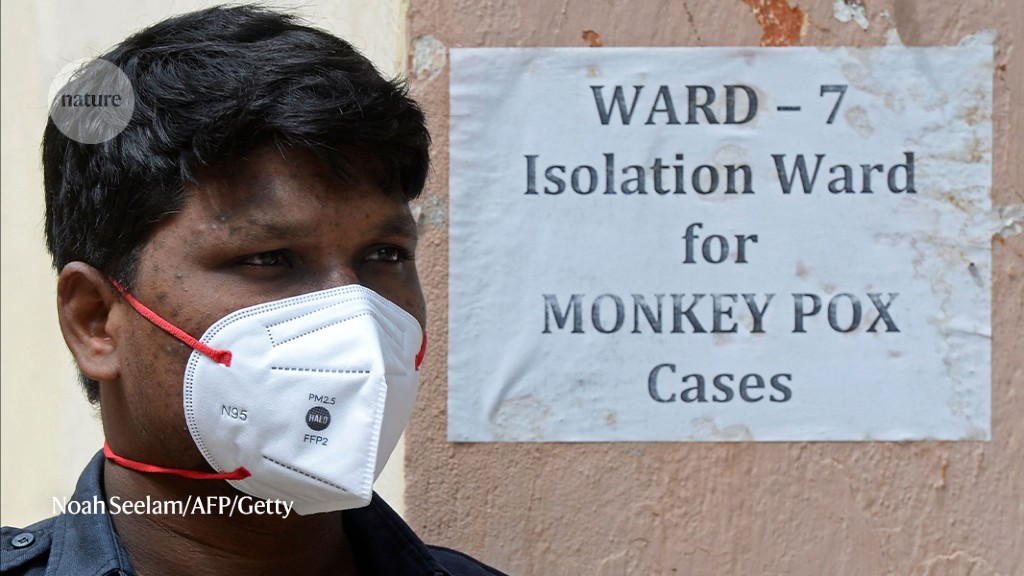‘The disease will be neglected’: scientists react to WHO ending mpox emergency

Some researchers worry that regions including Africa will suffer if global attention moves away from the outbreak

Cases of mpox — the disease previously known as monkeypox — are still rising in some parts of the world.Credit: Noah Seelam/AFP/Getty
The World Health Organization (WHO) announced on 11 May that mpox is no longer a public health emergency of international concern (PHEIC) — but researchers are concerned that the decision will draw critical resources away from curbing the outbreak, which is still prevalent in regions including Africa.
“My biggest worry is that investments and resources for tackling mpox will dwindle, and efforts triggered by the 2022 outbreak will not be sustained,” says Boghuma Titanji, a physician-scientist in infectious diseases at Emory University in Atlanta, Georgia. The WHO director-general made the decision after a recommendation by the organization’s mpox emergency committee on 10 May.
“We have many problems we are facing in Africa,” says Dimie Ogoina, an infectious-disease physician at Niger Delta University in Amassoma, Nigeria. Ogoina is a member of the WHO emergency committee, but he didn’t fully agree with its consensus recommendation to end the PHEIC. “The disease will be neglected just the way it has been neglected for a long time before the 2022 outbreak,” he says.
Ogoina and Titanji say that the declaration of mpox as a PHEIC in July 2022 helped to focus the world’s attention on the disease, which had previously been neglected despite being endemic to several countries in Africa. (The disease was previously known as monkeypox, and the virus continues to be called by that name.)
Millions of vaccines have been distributed to tackle the outbreak, but mostly in rich countries such as the United States and the United Kingdom. Vaccines and treatments have largely been out of the reach of African nations.
“Before the 2022 outbreaks and mpox becoming a disease of global importance, it was a disease that disproportionately affected poor populations in remote parts of west and central Africa,” says Titanji. “I fear that we will see a return to that status quo at least until perhaps the next outbreak that impacts wealthy countries in the West.”
Disease of priority
The PHEIC designation helped to stimulate support from governments and public-health leaders in Nigeria and other affected countries in the continent, says Ogoina. “It also has a way of making African leaders, politicians, public-health authorities see that monkeypox is a disease of priority,” he says.
In his announcement, WHO director-general Tedros Adhanom Ghebreyesus pointed to global progress in controlling the mpox outbreak in recent months, noting that there were almost 90% fewer cases reported in the past three months compared with the previous three. However, the WHO’s latest situation report, published on 11 May, suggests a slight rise in cases globally in the past week.
Since the WHO’s previous situation report published on 27 April, 264 new mpox cases and 10 related deaths have been reported to the organization. Most of the infections were in the Americas, particularly in Mexico and Brazil, and in the western Pacific region, including in Japan, China, South Korea, Singapore and Australia. In total, more than 87,000 mpox cases and 140 deaths have been recorded in 111 countries since the outbreak began.
Titanji says that the coming Northern Hemisphere summer might encourage infection spread. “We’re beginning to hear about reports of new clusters of cases, some of these cases being reported in people who were vaccinated last summer — and there’s still lots of things we don’t understand about this virus and how its moving within populations,” says Titanji. “These questions need to be addressed before we take a victory lap and say, we’re done with this.”
“Large swathes of the population do not have immunity against mpox,” she says. “If the disease is introduced into the right networks by travel, by festivals and all that happens around the summer, then it’s not unrealistic that we may yet again see surges in this outbreak.”
Incomplete reporting
In Africa, the latest WHO report notes that the case trends remain unclear owing to reporting inconsistencies. “We’re not sure of the level of ongoing transmission because what we have in Africa is essentially an undercount,” says Ogoina. He also fears infections will rise in the coming months. “We’re going into a period where we may have social gatherings that may serve as super-spreader events. There are still ongoing transmissions in some countries although there has been significant decline,” says Ogoina. “My concern is that we may have a resurgence.”
Ogoina underscores that Africa nations still have vastly fewer resources to control infections than rich countries. “PHEIC was an opportunity for us to galvanize support to see that we understand the disease better in Africa, to see that we have vaccines and therapeutics in Africa, but currently we still don’t understand the disease as we ought to,” he says. “We still don’t have vaccines. We still don’t have therapeutics.”
When asked by Nature at a press conference on 11 May if the decision to end the PHEIC would result in mpox being neglected, the WHO’s executive director of health emergencies Michael Ryan said: “It is a neglected disease. And it’s been totally neglected during this outbreak. In fact, WHO had to fund all of this international response purely on the basis of a contingency fund for emergencies — not one dollar was received from donors to support this response and support countries.”
“We don’t want this to be a neglected disease going forward,” added Rosamund Lewis, the WHO’s technical lead for mpox. “Efforts need to be made to continue surveillance, to continue capacity building in African countries specifically, to continue working with most affected communities.” Those groups include men who have sex with men and people who don’t have access to testing, vaccines or treatments, said Lewis.
doi: https://doi.org/10.1038/d41586-023-01581-1
This story originally appeared on: Nature - Author:Layal Liverpool


















